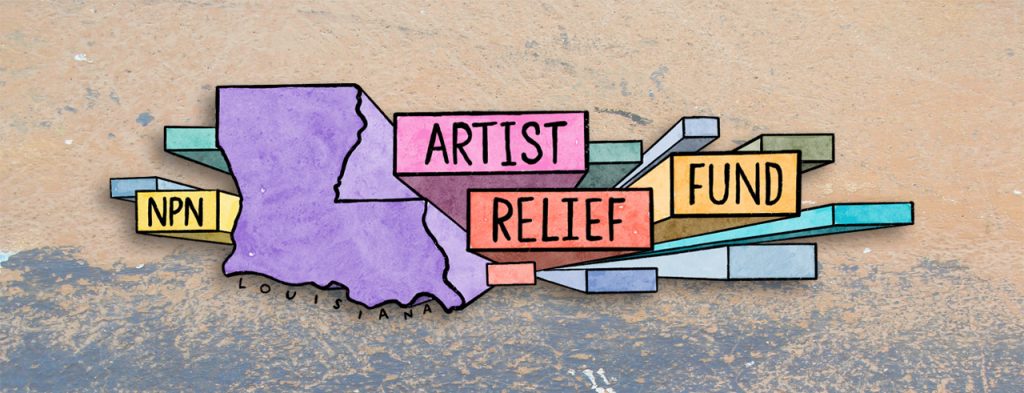The NPN COVID-19 Artist Relief Fund: A Trust-Based Model
July 2, 2020 • 4 minute read

With seed funding from the Ford Foundation, the National Performance Network (NPN) has awarded nearly $200,000 to Louisiana-based artists and cultural organizations of color experiencing significant financial losses as a result of the COVID-19 pandemic.
One fund provided $150,000 to independent artists of color in the amount of $1,500 per artist to offset financial losses as a result of the pandemic. An additional fund granted $50,000 to small Louisiana arts organizations led by people of color. Recipients represent the range of artistic practices that shape the New Orleans region, including the significant culture-bearing work of Black Masking Indians.
“In designing the program, we asked ourselves what a humane process would look like,” says NPN President and CEO Caitlin Strokosch. “It was important to us to prioritize artists who often fall through the cracks of other funding opportunities, to make the process as simple and expeditious for applicants as possible, and to provide a grant sizeable enough to have a significant impact relative to our local economy. We looked to operate at a scale that allowed for hands-on stewardship of the fund. And we didn’t want eligible artists to have to compete for limited funds and be rejected for support.”
NPN shared the announcement with Louisiana arts leaders and artists to identify eligible applicants from the community—each artist who applied was invited to nominate another. The process allowed NPN to move at a human scale in deep conversation with community leaders; ensure we were reaching artists from a range of disciplines, career stages, and creative practices; and pause when the fund was nearing depletion so we wouldn’t have to turn anyone away. “The one thing we didn’t want to do was to have to send declination emails,” says Director of Local Programs Stephanie Atkins. Her approach was personal and hands-on, including assisting some applicants with the form over the phone. “A lot of it was just talking to people, hearing from them, and letting them share what they’re going through. For many, NPN’s email was the one that came in at the right time.”
As a native New Orleanian and staff liaison for NPN’s longstanding emergency preparedness advocacy both locally and nationally, Atkins led the Artist Relief Fund with a deep knowledge of how rapid-response funds can either address or exacerbate inequities. Indeed, national and local data have since shown racial disparities in the impact of the COVID-19 pandemic. The fund was crafted for Louisiana’s artists, prioritizing outreach to Black Masking Indian culture bearers and Indigenous communities in particular, and aimed to remove barriers to accessing funds. In addition to the grants for artists, funding also focused on sustaining small culture-bearer organizations, recognizing these as both crucial to Louisiana’s cultural landscape and as particularly vulnerable.
“After the August 29, 2005 federal levee failures, economic relief to Mardi Gras Indians, Social & Pleasure Clubs, Brass Bands [and] Indigenous artists in general was impeded by barriers that excluded based on rigid requirements,” writes Cherice Harrison-Nelson, founder of the Mardi Gras Indian Hall of Fame and an elder in New Orleans’ Black Masking Indian community. “Most disturbing was the use of the cultural traditions in funding pleas that featured the very artists not equitably being included. Pictures and video clips of African American cultural expressions . . . were commonly ‘used’ to enhance the coffers of granting organizations.” Harrison-Nelson also cited current exclusionary practices that limit access to funds for Louisiana culture-bearers, such as requiring extensive tax and banking documentation. “That may seem like a low barrier; however, many Indigenous-tradition artists are immediately deemed ineligible to apply because they have creatively found other ways to conduct business and manage their finances on a primarily cash basis.”
Eligibility for NPN’s Artist Relief Fund was limited to generative artists living in Louisiana who identify as Black, Indigenous, and/or People of Color (BIPOC), whose primary income is derived from contract or freelance work, and whose household income falls below Median Family Income guidelines for our state. Applicants were asked to confirm eligibility, but no documentation was required as proof. Nor was any narrative required, though artists had the option of sharing personal stories about how the pandemic was impacting them. “We didn’t want people to have to articulate traumatic and intimate circumstances, which the New Orleans community was constantly asked to do in the wake of Hurricane Katrina,” says Strokosch. “You’ve already shared you’re below a certain income and that you’re an artist of color in Louisiana. That’s enough.”
The relief fund was an opportunity to deepen relationships with artists in NPN’s community and learn about artists we hadn’t known previously. “I’m excited about all of them, honestly,” Atkins said. “I had a conversation with an older musician and discovered he’d written songs for the Dramatics and Gerald Levert. You don’t find those things out through a strictly online process.” The artist recipients range in age from 21 to 88, working in all artistic disciplines and across all career stages.
NPN also gathers weekly with about 30 other arts organizations as part of the New Orleans Creative Response Network to share information and resources on a range of relief efforts. Creative Response! established the Platforms emergency relief fund program for New Orleans artists in partnership with local and national organizations. The group is conducting research to identify funding gaps and ongoing needs of artists and creatives to shape future efforts at sustaining our creative communities toward recovery.
The economic devastation of this pandemic on artists—and artists of color in particular—will be long-lasting. This is especially true in New Orleans, where the creative economy relies heavily on tourism and festivals. NPN hopes to raise additional support for local artists, both to meet urgent needs and assist them in adapting their practices to new realities.
For more, visit the NPN Artist Relief Fund page.